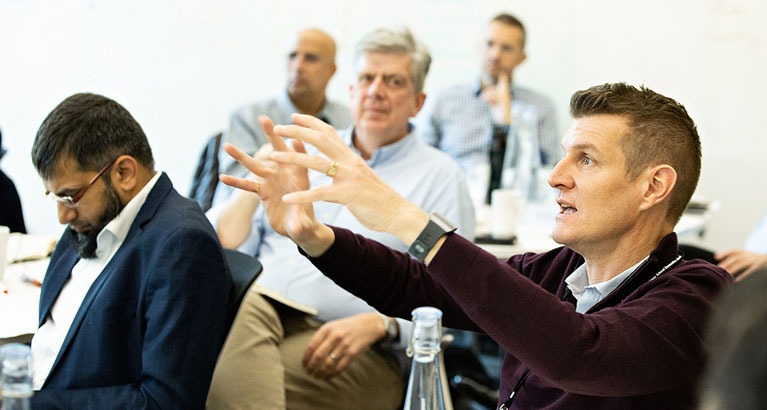Why is ESG central to the long-term success of any organisation today?

Jaideep:
Firms of all sizes are facing huge pressures from several different groups to be more accountable and transparent about their environmental, social and governance actions and impacts. Some of these groups include investors, employees, customers, regulators and civil society. Given that the mid- to long-term success of companies depends in one way or another on the support of these groups, improved performance on ESG becomes central to that success. Of course, side by side with good ESG perhaps, firms also have to deliver on financial performance and customer service, so ESG cannot be a substitute, rather it is a complement to business as usual.
Eden:

Besides the reasons above, ESG could also be an excellent opportunity for companies to pursue and achieve breakthrough thinking in technology and product innovation. At present, companies pass a significant portion of its intangible cost of operations to the society and the environment, eg environmental cost, human cost, social cost, cultural cost and so on. But in the future, as various costs of operations become more transparent, companies whose business models and processes are not centred around ESG will find themselves unable to sustain themselves financially. So, ESG is on the one hand a compliance issue, and on the other hand, an enormous opportunity for companies to be future-ready by pursuing radical innovations that can potentially transform the entire industry and market.
What is an ESG-centred marketing practice?
Jaideep:
ESG-centred marketing practice is the integration of ESG issues and concerns into the entire marketing decision making process. So rather than being an add-on or afterthought, ESG thinking has to be integrated from the get go with standard marketing processes and decisions. Thus, all aspects of choosing markets to operate in, finding segments to target and then positioning offerings for target segments using the 4Ps must be informed and guided by ESG considerations alongside traditional considerations of financial value, market share, customer satisfaction and so on.
Eden:
To build on what said above, ESG-centred marketing has ESG as the very basis for the design and delivery of its customer value propositions and customer experience both internally and externally. For example, an ESG-oriented product must be environmentally friendly, socially responsible and at the same time problem-solving. Moreover, a truly ESG-oriented product should be designed and produced by a more diverse team which embraces inclusion principles when recruiting and promoting its members. Such a product is capable of satisfying stakeholders’ rational, emotional, psychological and social needs holistically. Therefore, it will easily gain enormous competitive advantage in future marketplace.
How can an organisation effectively establish such an ESG-centred marketing practice?
Jaideep:
The first place to start is for the marketing leadership of the firm, alongside the top management (C-suite) of the firm, to go on a ESG leadership course like the one we now deliver at Cambridge Judge: Sustainable Marketing Leadership. Such a course will be a fast track to understanding the issues, absorbing the frameworks and language, learning about the relevant tools and current best practices in this space. It will also help the top team put in place an action plan for establishing an ESG-centred action plan and then implementing it in the months following the course with input from our experienced mentors.
Part of this process will involve doing an audit of where the marketing practice of the firm currently sits in terms of ESG performance (alongside traditional metrics of performance). Then this needs to be placed next to the aspiration of where the firm wants or needs to be in terms of ESG performance over the next year, the next 3 years and the next 10 years. And then a plan needs to be formulated and implemented.
Eden:
Besides mentioned above, organisations need to establish more ESG-centred operational model and business processes to enable and incentivise all its members to embark on this journey. It is also important for an organisation to show the real benefits of ESG-centred marketing to both individuals and organisation early on with compelling evidence. For example, if an organisation manages to achieve superior market performance through the launch of an ESG-centred products or services, such an event will send powerful messages to the rest of the organisation motivating all members to get on this bandwagon. In a word, training and education, cultural change, auditing, organisational redesign in its model and processes, and early win are all important drivers for the successful implementation of ESG-centred marketing.
What are the biggest organisational challenges faced by firms in doing so? How to overcome them?
Jaideep:
Change of the sort that an ESG-centred marketing organisation required is challenging. It requires bringing a large number of internal and external stakeholders on board. It involves managing a large number of tensions, contradictions and paradoxes. For instance, balancing financial performance versus ESG performance, in the short versus the mid and long term. Overcoming these will require training, joint courses, and workshops, involving the firms leaders along with their teams. Followed by a clear plan of action and them implementation over an extended period of time. This will also require top management commitment and resilience to shocks along the way.
Eden:
Besides the cultural change or shift in mindset mentioned above, another key challenge is the establishment of new set of organisational capabilities required to practice ESG-centred marketing. For example, developing a new product now requires skills in engineering, ergonomics, aesthetics and consumer interface. However, for the development of an ESG-centred product, new capabilities such as insights on the environmental, social and cultural impact at both individual and organisational levels have to be in place. Acquiring new organisational capabilities is never an easy task as it is directly related to the training and recruiting of new talent, which relies on the new form and type of university-level education. Of course, the biggest challenge of all is the transformation itself. Even if all members of the organisation genuinely endorse such a new paradigm, shifting to a new regime or model of business operation is always a lengthy, costly and extremely effortful endeavour.
How will the ESG-centred marketing evolve over time?
Jaideep:
In due course, ESG-centred marketing will become fully integrated into how marketing in particular and business in general is done. In the near future there will be no distinction between marketing and ESG-centred marketing. It will just be one thing: good marketing practice.
Eden:
As the metaverse and other forms of the virtual worlds become “reality”, ESG-centred marketing has to be migrated into virtual worlds where virtual businesses and digital customers “live”. In a virtual world, the E out of the ESG may no longer be the most important component, yet S and G will become more dominant as the virtual world is expected to be more equitable and harmonious than the physical world. So, the ESG idea could be transformed into SGE, and new initiatives originated from the virtual world could spill over to the physical world and reshape our current understanding of ESG and its related practices.





